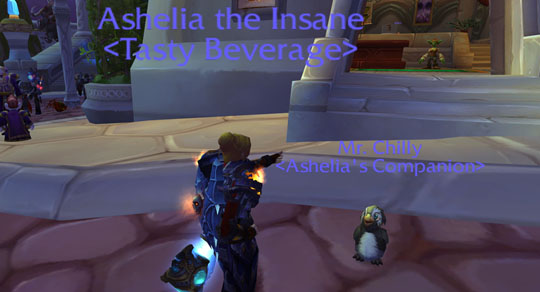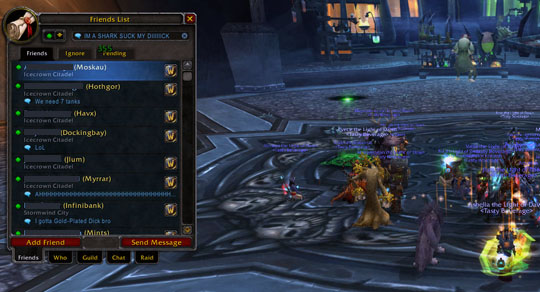Written by Ashelia

Back in the start of World of Warcraft, several years ago, I knew a guy who knew a guy. He was a forum warrior of sorts. He posted inflammatory stuff all day and night. One day, a group of people decided to reign him in and right the wrongs he’d besieged the community with. Long hours spent with search engines occurred and eventually a real life name was found. A few weeks later, a bouquet of roses and a dildo was sent to his door in care of his mother.
With the tables turned, the forum warrior was discovered to be just a helpless boy. He didn’t have an actual shield or sword like the name forum warrior implied. And his mother wasn’t very happy about the whole situation. The troll became trolled–and the realm of the internet carried over somewhat viciously into the real world.
Blizzard wrote today that with their new Real ID system, they hope to “connect the Blizzard community in ways they haven’t been connected before.” They plan on doing this by tying real life names to all forum posts from here on out.
I, however, posit that the community has been connecting in these ways for years–Blizzard is just naively unaware. And this is a very bad thing.
I remember when World of Warcraft’s mandatory merger with Battle.net was announced nearly a year ago. It was just an e-mail address, a universal login of sorts; it didn’t seem too threatening. There were whispers of big brother, but they sounded dramatic and paranoid. We even got a free in-game vanity pet out of it as a reward–it was hard not to agree with it. It seemed like such an inconsequential thing and the penguin was really cute.

But I suppose that’s how these things start. Not with a bang, but with a whimper–a gradual step here and there until suddenly you look back to realize everything’s changed. In that case, Blizzard certainly has been busy. Months after release, Battle.net IDs have become Real ID and Real ID has become linked not only as an optional feature in games like World of Warcraft or Starcraft 2 but to less optional methods of communication, like the official Blizzard forums where Blizzard takes feedback, lets players mingle, and even answers support tickets.
When Real ID came out a few weeks ago, I threw caution to the wind. Although my name is fairly uncommon, I immediately added everyone in my guild. I did this mostly because I like my guildmates, I trust them, and I’m an officer of our guild; it would be strange for me to not use this service. We killed heroic Lich King together, we make all kinds of obscene jokes, and although I’m one of two females in the entire guild of forty or so people, harassment is never an issue. I’m an equal. I’ve been here for over a year, and as such, giving these players my real life name wasn’t an issue.
This is a privilege I fully recognize. I haven’t always been that lucky and others definitely aren’t. But even in my privilege, there was a smaller problem. The guildmates I’d friended had friends who could see me as well because of this. For some reason, Real ID came with the feature that everyone can view other people’s friends–that is to say if I friend Joe, I can then see Joe’s friends and Joe’s friends can see me. It seemed wholly unnecessary and it was the first step in the Battle.net merger I would disagree with. The problem is, it wasn’t the last. It was, instead, the start of the proverbial slippery slope.
As I’ve alluded to, Blizzard announced today that all posts on their forums will be now using Real ID. This is mandatory–if you want to post, you have to post this way. Luckily it isn’t retroactive, but in the distant future for all Blizzard titles, real life names will be next to those who post. This will affect everyone, even Blizzard employees. They are also adding a karma feature that will be a lot like Reddit or Digg.
This is a horrible idea. Forcing people to sign real life name to a forum post is problematic on a basic level. The internet is largely what it is because of its anonymity–for better and for worse. Many great discussions have been had solely because someone could submit their words without worry of being judged. While it’s unavoidable that some people use anonymity to grief others, they aren’t as large factor on forums as heavily moderated as Blizzard’s. When Blizzard offers that requiring the inclusion of real life names will make gamers more civil and promote polite discussion, I must wonder if they’ve seen most gamers. The ones who played by the rules–who will sign at the dotted x on every forum post–were never the ones who were meant to be civilized. In fact, they are the ones being punished by this new system.

All Blizzard is effectively doing is giving those who fall between the cracks and margins more fodder to mess with people who do continue to use their services. A lot more fodder. Real life names, addresses, and downright terrifying fodder.
Additionally, by using a full name, players are tied to their real life persona and unable to separate themselves from their online one. In this system, it becomes linked forever in search engines. This means potential employers could find out if a player was a World of Warcraft fan and even the characters they have with a simple search. As cool of a story as it would make to be fired because your boss is staunch Horde and you’re Alliance (or more likely, because you play video games and your employer frowns upon MMORPGs in general), realistically there are aspects of one’s private life that don’t look good during an interview process. My boss doesn’t need to necessarily know if I have three level 80s, or if my arena team is about to get Gladiator using a cheap team composition.
There’s other issues, too. Women might find it harsher with new avenues of harassment opened. Transgendered people could be inadvertently outted when someone sees Sally, the friendly Paladin chick, posting under the name Steve. Someone could have a distinctive name and be disregarded solely because their name sounded like a person of a certain background, race, religion, or otherwise. And if someone’s a minor–or even major–celebrity, having their name exposed could be damaging. From Felicia Day to Mila Kunis, I doubt they’d like their alternative identity exposed simply because they decided to post a suggestion on the WoW forums or report a bug to support.
At the time of writing this, I have a friend who works for Blizzard and even she is upset about her name being tied to her video game identity–just a quick Google search with her real life name and you can find her LinkedIn where she mentions her affiliated companies, one of which is Blizzard. She says she simply will stop posting on the forums to avoid any mishaps, but she shouldn’t have to. To some degree, she knows and admits this, but what can she do? It’s her lifeblood. She’s not able to just quit her job because of a bad policy, so instead she’ll just opt out of posting on forums she enjoys.
That’s largely the point. People shouldn’t have to stop posting or stop using a product because of a larger marketing scheme. This should have never been a decision. There should have been another option; I can think of several off the top of my head. Blizzard could have adopted a Steam-like policy of usernames and then nicknames so users can define exactly how personal they would like their encounter to be. Another solution would have been to use a first name and last initial instead. Or maybe unique ID codes could be linked to real life names, but the code could be shown in the public so people don’t know their real life details.
And as for the ability to like posts and promote them to the top, maybe I’m negative, but I can see it quickly getting out of hand. Imagine an entire guild down voting your suggestion to a developer for no reason other than your guild is their rival guild or because you used to know them until you had a falling out of sorts. Of course, by even posting your suggestion out there, you’ve just given hundreds of people who may or may not loathe your existence your full name–let alone the trade chat trolls who will find it.
I mean, you better hope they are mostly all bark and not a lot of bite. And you really better hope they aren’t remotely connected to 4chan or other internet groups. Or at least not good with a phonebook.

When Blizzard first unveiled the Real ID system, I was excited against my better judgment. It brought my WoW guildmates together. We did things like make fun of each other’s names, put updates that were laughing at inside jokes, and enjoy the novelty of seeing formal names instead of character whispers in-game. But the novelty has since worn off with this announcement and now I’m disappointed. Extremely disappointed, actually.
Like I said, there were options. Unfortunately it seems Blizzard executives chose not to look into them and then turned a blind eye. It’s just a shame that this lack of foresight will probably at the very least result in the harassment of many thousands of individuals–if it doesn’t end up causing something worse for a select few.
As for me, I haven’t forgotten about the person from France who spent over six months to track down and attempt murder on a guy who fragged him in Counter-strike (NY Daily News). Call me pessimistic all you want, but I have to wonder if Blizzard’s marketing department even thought about it.
Or if they’ll even listen to us now.
mental case
This junk is hilarious! Well done, author!
His wife has taken leave of her senses. I mean, I get into books but DAMN!
At least my husband only has to put up with my obsession over the Sookie Stackhouse Novels. Lucky him.
http://games.slashdot.org/story/10/07/09/174024…
Yep, That is great, I can let my guilt go over my “Words w/Friends” addiction!